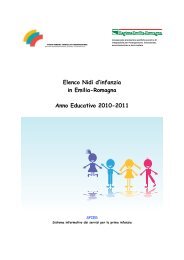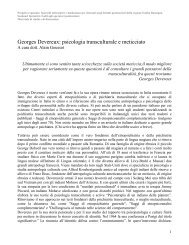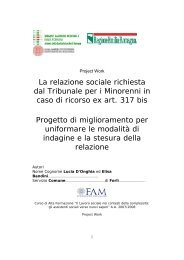Introduzione alla traduzione italiana dei Libri Bianchi dei Casey ...
Introduzione alla traduzione italiana dei Libri Bianchi dei Casey ...
Introduzione alla traduzione italiana dei Libri Bianchi dei Casey ...
Create successful ePaper yourself
Turn your PDF publications into a flip-book with our unique Google optimized e-Paper software.
Emancipation<br />
Emancipazione<br />
Entitlement (Parental<br />
entitlement)<br />
Entitlement (Entitlement<br />
genitoriale)<br />
When children “age out” of the<br />
Child Welfare System. This is usually<br />
at age 18 or when they finish high<br />
school, which ever is later. In some<br />
cases youth younger than 18 can<br />
become “emancipated minors” but<br />
this has many legal requirements.<br />
When children are emancipated they<br />
are no longer wards of the court and<br />
social services no longer has to<br />
provide for them. 12<br />
In her book Raising Adopted Children,<br />
author Lois Melina states:<br />
“Developing a sense that a child<br />
‘belongs’ in the family, even though<br />
he/she wasn’t born into it, is a<br />
crucial test for adoptive parents.<br />
Unless parents develop a sense that<br />
the child is really theirs, they will<br />
have difficulty accepting that the<br />
child is really theirs. They will have<br />
difficulty accepting their right to act<br />
as parents.”<br />
She further says that a follow-up<br />
study by Benson Jaffee and David<br />
Fanshel suggests “that the amount<br />
of entitlement parents feel can be<br />
determined by looking at the extent<br />
to which they take risks with their<br />
children, deal with separation,<br />
handle discipline and discuss<br />
adoption with their child and<br />
others.” 13<br />
12 Glossary of Jargon, futurefamilies.org., “Emancipation”, 15 novembre 2007<br />
, futurefamilies.org<br />
7<br />
Si riferisce al momento in cui i<br />
giovani raggiungono la maggior età<br />
e quindi escono dal Sistema di<br />
Assistenza ai Minori. Di solito<br />
escono dal sistema all’età di 18<br />
anni, oppure dopo aver finito la<br />
scuola superiore, nel caso che ciò<br />
avvenga dopo l’età di 18 anni. In<br />
alcuni casi i giovani di età inferiore<br />
ai 18 anni possono diventare<br />
“minori emancipati”, ma i requisiti<br />
legali stabiliti per raggiungere<br />
l’emancipazione sono molti. Con<br />
l’emancipazione, i giovani non sono<br />
più sotto la tutela del Tribunale e i<br />
servizi sociali non hanno più<br />
l’obbligo di provvedere al loro<br />
mantenimento, o di occuparsi di<br />
loro. 12<br />
Nel suo libro, Raising Adopted<br />
Children, l’autrice Lois Melina scrive:<br />
“Sviluppare un senso che un<br />
bambino ‘appartiene’ <strong>alla</strong> famiglia,<br />
anche se lui o lei non è nato/a in<br />
quella famiglia, rappresenta un<br />
esame cruciale per i genitori<br />
adottivi. Se i genitori non<br />
percepiscono che il bambino, sia<br />
proprio il loro bambino, avranno<br />
difficoltà ad accettare che lo sia<br />
veramente. Avranno difficoltà ad<br />
accettare il loro diritto di agire in<br />
qualità di genitori.”<br />
L’autrice aggiunge che uno studio<br />
di monitoraggio condotto da<br />
Benson Jaffee e David Fanshel<br />
suggerisce “che il grado di entitlement<br />
percepito dai genitori, può essere<br />
valutato considerando quanto sono<br />
in grado di rischiare con i figli, di<br />
affrontare la separazione, di gestire<br />
13 Adamec, Christine & Pierce, William, Ph.D. The Encyclopedia of Adoption, 2nd Edition, Facts on File, Inc., 2000,<br />
“Entitlement”, adoption.com, 15 novembre 2007,


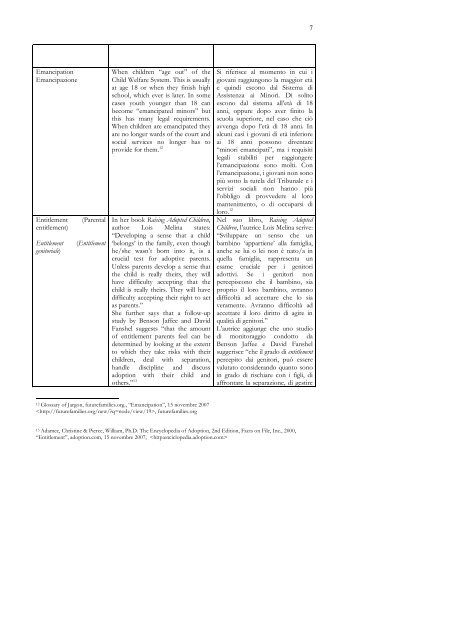
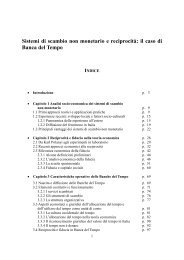
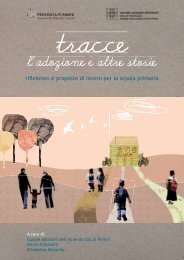
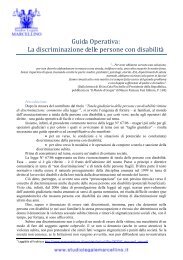
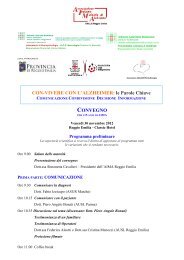

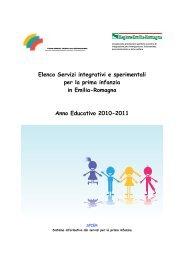


![[PDF] Atti del convegno - Regione Emilia-Romagna](https://img.yumpu.com/15640875/1/185x260/pdf-atti-del-convegno-regione-emilia-romagna.jpg?quality=85)
